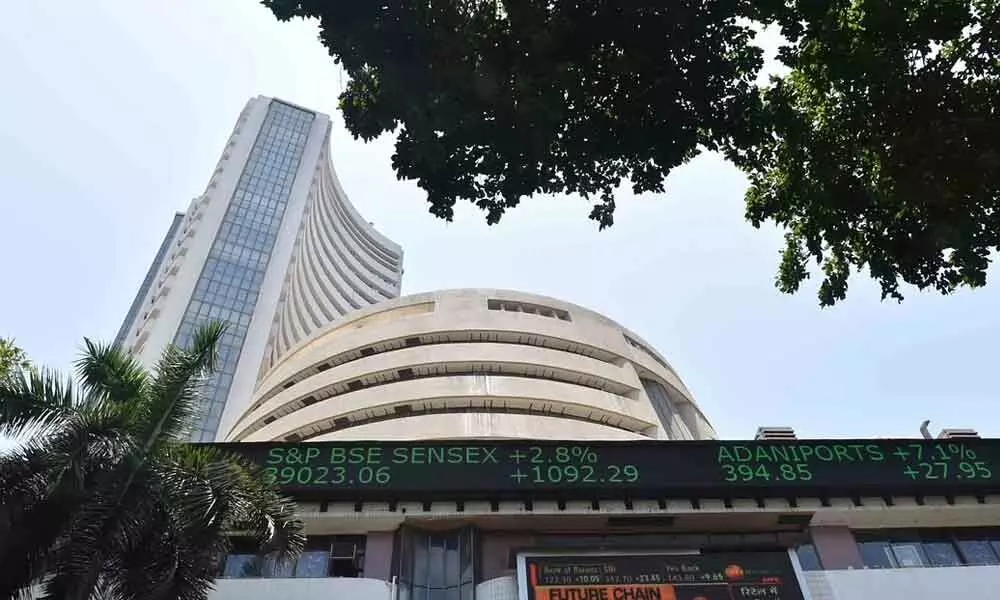Mkt uncertainty continues to baffle investors

The next few days are going to be crucial for the domestic equity market as a number of crucial domestic and global events are lined up this week
Unnerved and weighed down by weak global sentiments and fears of banking contagion in the US; the domestic stock markets across the globe concluded a volatile week, in which the fallout from two bank failures rippled through financial markets. Sentiment turned highly fragilewith the feeling of 'What's next?'In the week ended, BSE Sensex lost 1,145.23 points or 1.93 percent to end at 57,989.90 points, while NSE Nifty shed 312.9 points or 1.79 percent to close at 17,100 points. The Small-cap index declined nearly three percent and the Mid-cap Index shed two per cent. Foreign portfolio investors (FPIs) have been taking shelter in safe havens such as gold and dollar consistently so far this year. They have net sold about Rs23,283 crore of equity in 2023. FPIs are unlikely to turn net buyers in the near-term.
The rupee finished at 82.55 per dollar, compared with its previous close of 82.73. The rupee is expected to gain next week on continued year-end funds flows. Better part of the Parliament session was washed out on account of protests on the floor of both the houses. The next few days are going to be crucial for the domestic equity market as a number of crucial domestic and global events are lined up this week. The two-day Federal Open Market Committee Meeting (FOMC) of the Federal Reserve will begin on 21 March 2023, Tuesday. All eyes will be on the US Fed this week as it faces an unenviable task to tame sticky inflation without adding turmoil to the financial sector after Silicon Valley Bank's rapid collapse.
The street will be keeping a close eye on the event following a spate of banking crises that surfaced over the past one week. There is fear and investors don't know at this juncture what the extent of the damage is and whether there's another group of banks in trouble.
Globally the uncertainty has prompted some investors to add to assets typically seen as havens in times of volatility, such as government bonds and gold. Some investors are hopeful that the fallout from bank failures will lead the Federal Reserve to pause its recent flurry of interest-rate hikes at next week's meeting. Interestingly, Bitcoin—whose proponents sometimes call it a form of digital gold—touched an intraday high of nearly $27,000, its highest price so far this year. In energy markets, Futures on benchmark Brent crude oil tumbled 2.3 per cent to settle at $72.97 a barrel, its lowest level since December 2021. Weekend speculation that UBS Group is nearing a deal to take over Credit Suisse Group AG as part of an urgent effort engineered by Swiss and global authorities to restore trust in the banking system. It should ease some of the fears in near term. Despite a short-term pullback, analysts advise investors to be cautious going ahead.
Listening Post
Value stocks haven't performed well for a long time. But Ben Graham's lessons still matter. The idea he fostered—buy cheap stocks and hold them for superior long-term returns—is looking geriatric, too. Faster-growing, higher-priced stocks have outperformed by such huge margins recently that the long-run advantage of value stocks has withered away. Will that last? Probably not. Was Graham wrong? Almost certainly not. But value investors shouldn't try to hide how dark the evidence looks—and they should ponder whether the world has changed.Graham, Warren Buffett's teacher and one of the greatest investors of the past century, had three profound insights.First, a stock isn't a piece of paper or an electronic blip, but an ownership stake in an underlying business that can be evaluated based on the cash it is likely to produce.Perhaps value investing got too popular for its own good.Second, the stock market may swing from euphoria to misery, but you aren't obliged to share its moods. Third, you must allow a margin of safety—a cushion of value that comes from thinking in ranges and probabilities rather than believing in exact certainty. Still, Graham-style investing hasn't been very stylish lately.
That may be partly because giant technology companies seem to be getting even more dominant as they grow bigger, instead of becoming more sluggish. That could mean weaker competitors may no longer be able to recover from setbacks that once would have been temporary—making the turnaround stocks long favoured by value investors less likely to turn around. Or perhaps value investing got too popular for its own good. After technology stocks were crushed in 2000-2002, investors favoured safety over growth. As value went from pariah to crowd-pleaser, its returns went cold. Meanwhile, fewer investors analyse one value stock at a time by hand. Often, they use computers to buy the value factor en masse, capturing cheapness as a common attribute across hundreds of stocks at once.
That has lowered costs for investors. But it has also driven up prices, reducing the supply of bargains among value stocks. Think of stock picking as a poker game. If the weak players have left the table, then the only people left are the smart players. For one of these remaining sharpies to win, the others have to lose.
The game becomes more difficult, not simpler or easier. It's especially important, in a world increasingly dominated by index funds and managers mimicking them, for investors to separate themselves from the herd. That means doing what even most professional investors can't: investing patiently in companies that measure their own progress against long-term goals, rather than short-term earnings or recent stock-price changes.
Quote of the week
The four most dangerous words in investing are, it's different this time. — Sir John Templeton
Follow market trends and history. Don't speculate that this particular time will be any different. For example, a major key to investing in a specific stock or fund is its performance over five years.
(The author is a senior stock market analyst and former vice-chairman of AP Planning Board)








